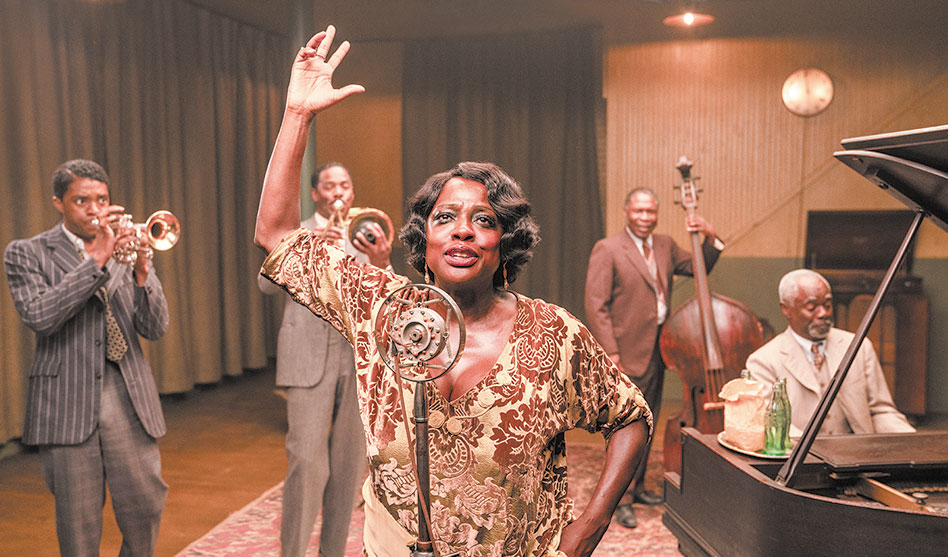Viola Davis shines in ‘Ma Rainey’s Black Bottom’
Gregg Shapiro | Contributing Writer
greggshapiro@aol.com
Going to the theater to see a play is on hold for the near future, even as talk of a COVID-19 vaccine is getting mixed reviews. Fortunately, there are enough movie adaptations on the way — including The Prom, Everybody’s Talking About Jamie, In The Heights and West Side Story — to quench a theater queen’s thirst.
Sadly, the late, prolific playwright August Wilson, who died in 2005, never got a chance to see the movie versions of two of his plays: Fences from 2016 and 2020’s Ma Rainey’s Black Bottom (Netflix). He probably would have been particularly pleased with the performances of Viola Davis, who won a Best Supporting Actress Oscar for Fences and appears to be a shoo-in for an Oscar nod for Ma Rainey’s Black Bottom.
From the moment she appears onscreen, performing a show in a tent in rural Georgia in 1927, followed by a more professionally presented concert in a theater, it’s impossible to take our eyes off of queer mother of the blues, Ma Rainey (Davis). From her gold teeth and dark eye shadow to her glorious dresses and occasional fur collar, she is a sight to behold.
In Chicago for a recording session, she is accompanied by her nephew — and driver — Sylvester (Dusan Brown) and her lover Dussie Mae (Taylour Paige), and for every stare she gets, she gives it back double.
Her band, led by trumpeter Cutler (gay actor Colman Domingo, whom some may remember for his portrayal of Maya Angelou on The Big Gay Sketch Show), is already at the studio rehearsing for the session. Also there is pianist Toledo (Glynn Turman), bass player Slow Drag (Michael Potts) and ambitious trumpeter Levee (the late Chadwick Boseman).
Levee is an unrelenting thorn in Ma’s and the band’s side. He writes and plays arrangements that differ from Ma’s. He scoffs at the older band members, becoming threatening to Cutler and Toledo. He even dares to flirt with Dussie Mae.
Here’s the problem with Ma Rainey: In the hands of gay, Tony Award-winning director George C. Wolfe, the movie alternates between being stagey and cinematic. The scenes with band members in the rehearsal space before Ma’s late arrival are filled with typical, if exaggerated, male banter, teasing and competitiveness. There is talk of God and blasphemy, the ways black men must find to survive in white culture. The rehearsal space, with one open door and one locked door, feels claustrophobic and too theatrical, and the often-repetitive dialogue doesn’t help matters.
Enter Ma Rainey! Each and every scene in which she appears, from the car accident in front of the studio and her heated interactions with white manager Irving (Jeremy Shamos) and recording studio head Sturdyvant (Jonny Coyne) to her intimate moment with Dussie Mae and her encouragement of stuttering Sylvester are gloriously vibrant. Her clashes with Levee are raw and real. Her performance at the recording studio mic is riveting.
It makes you wish there was more Ma Rainey and less of everyone else.
Nevertheless, Boseman, in his final performance, more than holds his own from start to finish. Domingo also continues to prove himself a fine dramatic actor.
Rating: B-














I count on Gregg Shapiro for honest insightful reviews, and he doesn’t disappoint.